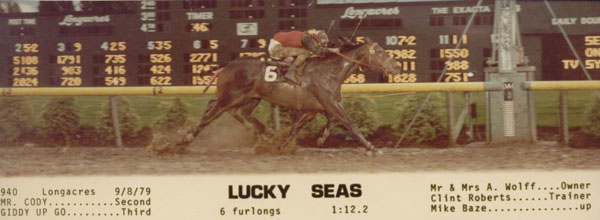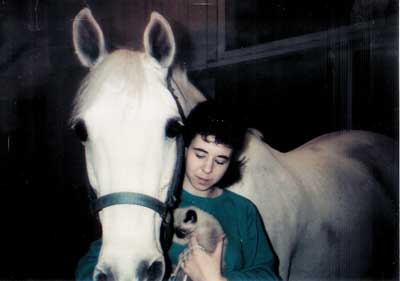 Communication – The Key to Success
Communication – The Key to Success 

Lucky Seas battling for the finish with Mr. Cody
Communication is key to successful human and horse relationships. Unfortunately, communication falters when unproductive thoughts interfere. Modern psychology says that thought precedes emotion and behavior; what you think affects how you act. The Belmont Stakes horse races of 2003 through 2005 provide excellent illustrations of how thought influences equine/human communication.
The Belmont Stakes is a mile and a half “route.” It requires strategic planning, precise communication, trust between horse and rider and above all, patience. For a mile and a quarter the horses must reserve their energy for the last quarter of a mile where the winner is determined. The team who communicates the best and retains power at the end, wins.
It is the jockey's job to guide the horse through the obstacles of the course. If the horse listens attentively and follows directions, and avoiding any bad luck, the pair should prevail. But not all athletes listen to their coaches.
In 2003 New York bred Funny Cyde was favored to win the Triple Crown after winning the Kentucky Derby and Preakness races. But the cacophony and pressure of race day were too much for the nervous chestnut. When the gates opened, Funny Cyde flew out and ran as fast as he could just to get away from it all. He never heard his teammate, Jose Santos, telling him to relax and focus on his job. Funny Cyde burned up his energy too early and finished third.
In 2004 Smarty Jones, a confident and proud colt, was also expected to win the Belmont and the Triple Crown. Sadly, Smarty Jones thought he was smarter than his partner, Stewart Elliot. When the gates opened, Smarty ignored Elliot who was telling him to relax and settle into a rhythm to conserve his energy for the tough finish. He took the bit in his teeth saying “LET ME GO, LET ME GO, I’M GONNA WIN, I’M GONNA WIN, LET ME GO!!” Smarty wasn’t so smart. He didn't listen so he finished second.
In 2005 Afleet Alex ran a textbook race in the Belmont. Communication between him and his co-pilot Jeremy Rose was symbiotic. When the gates opened, Alex was listening to instructions from Rose and followed directions. Running a relaxed, attentive race, Alex had plenty of “horse” left at the end and won easily. He wasn’t obsessed with nerves or ego. Instead he was able to listen to his partner and kept his mind on his job allowing him to bring home a paycheck.
Speaking as a rider, when your horse and you are able to communicate to the extent that you finish each others' sentences, it's the best thing in the world!
 Home
Home